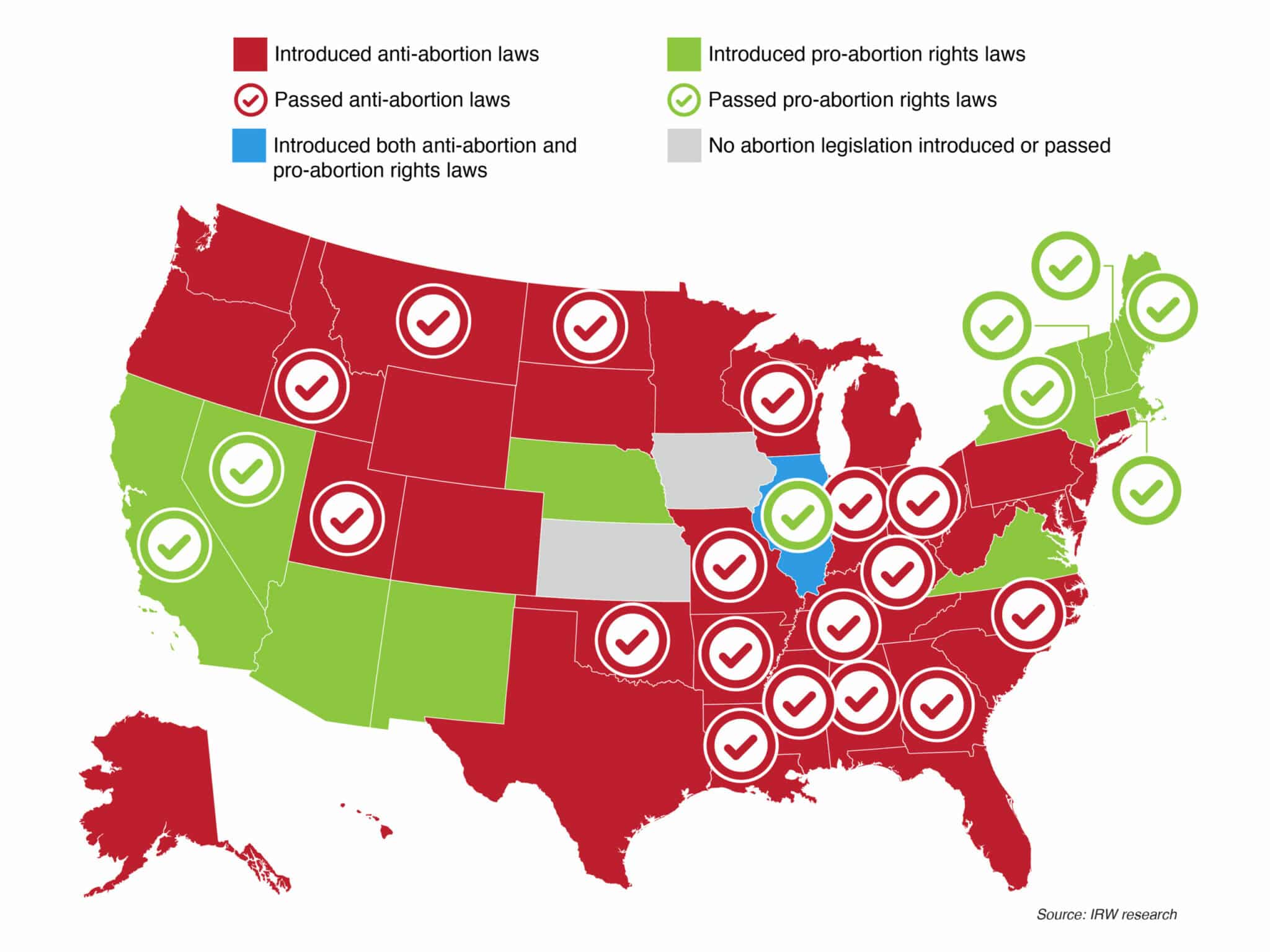After the fall of the 1973 ruling in the Roe v Wade case, the US states are given the power to decide if and how to allow abortions. According to the US abortion laws, the states can now ban abortions earlier than 12 weeks. Legal abortion in the USA now depends on the national divide and where you live, in the absence of a federal standard.
The Republican-led states have either banned or severely limited abortion in the aftermath of the ruling. On the other hand, several Democrat-led states are taking steps to protect abortion access. In this article, we will discuss the overview of the US abortion laws and what is the situation in other European countries.
Overview of state abortion law
The Roe v. Wade landmark abortion decision, which provided women with a constitutional right to abortion, was overruled by the US supreme court on June 24, 2022. The 6-3 decision by the Supreme Court gave the states the freedom to fashion their own laws, either to uphold abortion rights or prohibit and restrict them. The overturn resulted from Mississippi’s 15-week abortion ban challenge in the Supreme Court.
As a result of the overturning of Roe v. Wade, 13 states have trigger laws that marshal a complete ban on abortions in the aftermath of the Supreme Court decision. Most of the trigger laws make abortion a felony, restrict abortion access, and punish abortion providers. Trigger laws vary from state to state with exceptions for incest, rape, and the health of the fetus or the pregnant person. Among the 13 states, few enacted the laws immediately, although, for instance, in South Dakota this was the case. Others took a buffer time, altogether banning abortion 30 days after the Supreme Court’s decision, such Texas and Tennessee. Few other states did not mention the timing and are waiting for the state attorney general to approve a change formally. On September 1, 2021, Texas became the first state to implement abortion bans as early as six weeks of gestation since Roe v Wade was decided in 1973. As the impact of the Texas new law, the abortion rate dropped by 60% in the first month.
The current situation in the US is confusing, with all the regulations and new abortion restrictions in different states. The map below highlights the restrictions in all the states of the US.
Supreme Court ruling on Mississippi case
On December 1, 2021, the Supreme Court of the US heard the Mississippi case, challenging the 2018 abortion ban after 15 weeks, which is nine weeks before the point of viability. It is the first abortion case on the federal level that threatened to overturn Roe v. Wade.
Upon the overturning of Roe v. Wade, 26 states already planned to outlaw abortion completely. In 2021 alone, more than 108 anti-abortion laws were enacted. According to the Guttmacher Institute, this is the highest number of anti-abortion laws made in the country since Roe v. Wade.
Different types of abortion bans and restrictions in the states
The abortion laws that ban and restrict abortion access differ from state to state. In this section let us see the various types of abortion bans and restrictions present in the states after the overturning of Roe v. Wade.
Abortion ban type | Description |
Trigger bans | The trigger laws are to ban abortion altogether, if the Supreme Court overturned or limits the decision of Roe v. Wade, or if a federal constitutional amendment forbids abortion. |
Pre-Roe v. Wade bans | After the 1973 Roe v. Wade judgment, most states annulled abortion bans. However, some of them did not repeal the pre-Roe v. Wade bans. As the Supreme Court overturned the Roe v. Wade decision, these states might try to revive the pre-Roe v. Wade bans. |
Pre-viability gestational bans | Laws that ban abortion before the point of viability. |
Method bans | Under method bans, specific methods of abortion are banned. For instance, dilation and evacuation procedures and dilation and extraction procedures. |
Reason bans | Under the Reason ban, abortion is prohibited if it is sought for a specific reason such as gender, race, or genetic anomaly. |
Criminalization of self-managed abortion | Laws that criminalize those who perform an abortion outside a health care setting. |
SB-8 copycats | Laws that came into effect in September 2021, modeled after SB 8 to sue abortion providers and people who help others to get an abortion. |
Abortion Restrictions | Description |
Targetted Regulation of Abortion Providers (TRAP) | This law singles out the physicians who provide abortion care. This law imposes various legal requirements, including provider qualifications, reporting requirements, the location where the abortion is provided, etc. The compliance is often burdensome, costly, and requires unnecessary modifications to the facility. |
Consent laws | Pregnant people are required to attend counseling and ultrasound before abortion care. Also, in some cases, pregnant people are made to wait for a specific period of time after counseling and ultrasound for abortion care. |
Parental involvement | According to this law, those who are providing abortion care are required to inform the parents or legal guardians of young people seeking abortion prior to abortion. They must either notify the parents or get consent from them. |
Hyde amendment | The Hyde amendment was introduced in 1976, which prohibits federal funding for abortion. |
European region abortion laws

Abortion after the first trimester is allowed only for potential reasons, such as risk to women’s health or life, the genetic anomaly of the fetus, or women’s age. For example, in Austria, abortion after the second trimester is allowed only when there is a serious risk to a woman’s life, mental health, physical health, or if she is under 14 years of age. In Denmark, abortion can be done for various reasons, such as socioeconomic reasons. However, one needs to get authorization to have such an abortion. In Finland, abortion even up to 12 weeks requires authorization from two doctors. However, authorization is granted easily if the mother wants to have an abortion. The one state among all the European states that have banned abortion completely is Malta. Malta has one of the most restrictive abortion laws among European countries.
We shall see abortion situations in a few European countries below,
 Portugal
Portugal

In 1984, the assembly of the Republic enacted a law that permits abortion under certain circumstances, such as fetal disease, maternal health, rape, etc. In 1998, a national referendum was held to decriminalize the voluntary termination of a pregnancy. However, the referendum result was non-binding, as only 31.9% of voters participated in the referendum.
A similar referendum was held in 2007, where voluntary abortion was legalized and can be performed up until the 10th gestational week in accredited health centers in the country. Portugal’s abortion laws are changed to broaden the scope, where a woman can get an abortion when she wishes not to have the baby.
Under the abortion law in Portugal, one must have:
- Written consent (if minor, need a parent’s or guardian’s consent).
- Pre-abortion laboratory tests, pre-abortion consultation, and post-abortion consultation.
- A mandatory reflection period (three-day period) between the pre-abortion consultation and the abortion procedure).
- Contraception evoked in the three medical consultations.
If you are interested to know more about abortion access and the steps followed in Portugal refer to our guide on Abortion Laws in Portugal.
 Malta
Malta

The strict Maltese anti-abortion laws lead many women to ruin their health and finances, as they seek to terminate their pregnancy through abortion pills online, self-induced miscarriages, or travel to other countries that allow abortion, such as the UK, or Germany.
Currently, there are no exceptions in the Maltese law to allow abortion within the territory, even if a woman’s life is at risk, in cases of rape, incest, severe fetal malformation, or otherwise. However, an indirect abortion of ectopic pregnancy (when a fertilized egg grows outside the main cavity of the uterus) is allowed by a case-by-case decision.
Please refer to our guide on Abortion Laws in Malta for further information.
 Greece
Greece

The situations include
- Rape or incest: abortions can be permitted at 19 weeks of gestation.
- Fetal abnormalities: In the case of physical or mental fetal abnormalities, abortions can be permitted at 24 weeks of gestation.
- Risk to the pregnant woman: In the case of serious irreversible physical or mental damage to the pregnant woman, abortion can be permitted at any time during the pregnancy prior to birth.
Greece’s abortion law “1609” stipulates a certain set of mandates that include,
- The pregnant woman must be briefed about her choices before an abortion, such as her civil right to be a mother, family planning, child protection by the state, and all the repercussions that might arise from an abortion.
- The physical and mental health of the pregnant woman must be assessed and examined before the abortion procedures.
- All abortion procedures must be carried out under anesthesia by a medical professional specializing in obstetrics or gynecology.
- Written consent from the parent or legal guardian of minors (under the age of 18) must be submitted.
- The hospitals and clinics that provide abortion services must meet specified health standards.
If you want to know more about the abortion procedures in Greece, refer to our guide on Greece’s Abortion Law.
Global Citizen Solutions is a boutique migration consultancy firm with years of experience delivering bespoke residence and citizenship by investment solutions for international families. With offices worldwide and an experienced, hands-on team, we have helped hundreds of clients worldwide acquire citizenship, residence visas, or homes while diversifying their portfolios with robust investments. We guide you from start to finish, taking you beyond your citizenship or residency by investment application. How Can Global Citizen Solutions Help You?

Frequently asked questions
What is the current abortion law in the US?
At present, after the overturn of the Roe v. Wade decision, the abortion law in the US varies from state to state. The safe and legal abortion now depends on the national divide and where you live.
When was the first abortion law passed in the US?
In the early 1900s, every state in the US made abortion illegal after protests from male doctors to separate themselves from female healers and midwives who also perform abortions.
What is the cost of abortion in the US?
According to the Guttmacher Institute (a non-profit organization that aims to improve sexual and reproductive health and rights worldwide), the abortion cost in the first trimester is anywhere between $75 and $2500. The second-trimester abortion costs $1,195 and the later term can cost $3000. The price increases as pregnancy progresses. Also, the price depends on the type of abortion procedure and the size of the baby.
Is abortion legal in Portugal?
Yes, after 2007 abortion was made legal in Portugal up to the 10th week of pregnancy, as long as it is performed by experienced practitioners in accredited health services in the country.
Is abortion illegal in Malta?
Yes, abortion in Malta is illegal. The country has some of the strictest abortion laws in Europe.
Which countries allow free abortion in Europe?
The cost of abortion in Europe depends on the country’s abortion laws. In a few countries, the cost is paid by the patients while in other countries they are paid by the state. For instance, in Portugal, residents have the legal right to an abortion paid for by the state.



